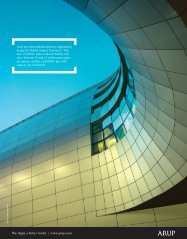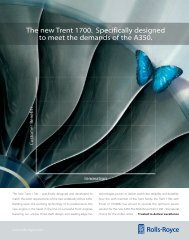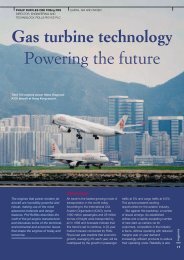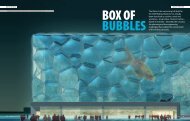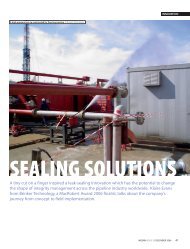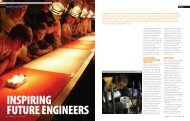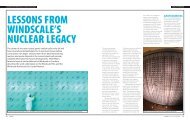Shipping safety - Ingenia
Shipping safety - Ingenia
Shipping safety - Ingenia
You also want an ePaper? Increase the reach of your titles
YUMPU automatically turns print PDFs into web optimized ePapers that Google loves.
MARINE MATTERS<br />
●<br />
●<br />
●<br />
●<br />
●<br />
●<br />
regulations are not always<br />
sufficient to enforce standards<br />
education and research need a<br />
fresh look<br />
there is too much tonnage<br />
chasing too little cargo<br />
weather routing (avoidance) is a<br />
weak crutch<br />
corporate and personal liability<br />
barely exist<br />
ship insurance provides a<br />
convenient cover.<br />
Figure 2: Capesize Selkirk Settler swamped by a huge wave crest<br />
Photograph by Captain G A Ianiev (courtesy of Captain Dennis Barber)<br />
Some industry weaknesses<br />
In 1836, following three years in which<br />
1702 British ships and 1714 lives were<br />
lost, a House of Commons Select<br />
Committee into The Causes of<br />
Shipwrecks concluded that the most<br />
frequent and generally admitted causes<br />
were:<br />
● defective construction of ships<br />
● inadequacy of equipment<br />
● imperfect state of repair *<br />
● improper or excessive loading *<br />
● inappropriateness of form *<br />
● incompetence of masters and<br />
officers *<br />
● drunkenness of officers and men<br />
● operation of marine insurance *<br />
● want of harbours of refuge *<br />
● imperfection of charts.<br />
●<br />
●<br />
●<br />
●<br />
●<br />
●<br />
●<br />
●<br />
solutions are rarely acted upon<br />
unwelcome events are generally<br />
suppressed<br />
profit is valued before <strong>safety</strong><br />
malpractices are not rare<br />
there are too many (and mainly<br />
prescriptive) regulations<br />
ship rules are not transparent,<br />
have no commentary and often<br />
reflect what is acceptable, not<br />
what is needed<br />
design ‘modelling’ of extreme<br />
loads and ship component<br />
strength is generally flawed and is<br />
often unsafe<br />
irrational tonnage rules are still<br />
used, some of which are unsafe<br />
In a single sentence, the industry is too<br />
complacent, turns a blind eye, is<br />
reactive more than proactive, and has a<br />
generally inadequate <strong>safety</strong> culture. It<br />
should manage <strong>safety</strong> risks with the<br />
same care and attention as it manages<br />
financial risks.<br />
This has led to ‘ships of shame’ (the<br />
tanker Erika (1999) was a good<br />
example, as are many bulker losses)<br />
and to declining standards. A recent<br />
inquiry into ship <strong>safety</strong> by the<br />
International Commission on <strong>Shipping</strong><br />
(ICONS) provides evidence of abuses,<br />
exploitations and injustices to seafarers,<br />
who often have to operate substandard<br />
ships in appalling conditions.<br />
At present the responsibility for<br />
substandard ships rests mainly with<br />
ship classification societies (CSs).<br />
Moreover, they are not independent<br />
arbiters of <strong>safety</strong>. Theirs is a competitive<br />
business which relies on pleasing their<br />
customers, the ship owners and<br />
operators. Despite the undoubted<br />
ingenia<br />
16<br />
It is sobering to observe (*) that six of<br />
these causes are still relevant today!<br />
Indeed, today we should admit to<br />
inadequate design for extreme storms<br />
and also add ‘mariners’ fatigue’, which<br />
has reached alarming levels.<br />
So, what is wrong with the shipping<br />
industry? Since Samuel Plimsoll’s day<br />
and from a survey of more recent<br />
opinions it seems that:<br />
●<br />
●<br />
things still move very slowly<br />
concern is bred of catastrophes<br />
Figure 3: APL China with smashed containers<br />
Courtesy of Pat Brandow



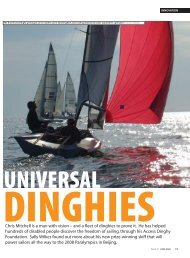
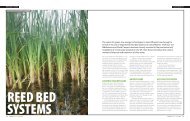

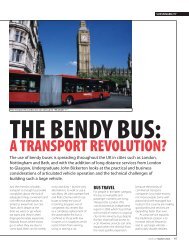
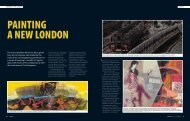
![[322/03] Francke - Ingenia](https://img.yumpu.com/23411337/1/184x260/322-03-francke-ingenia.jpg?quality=85)
